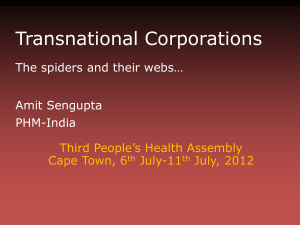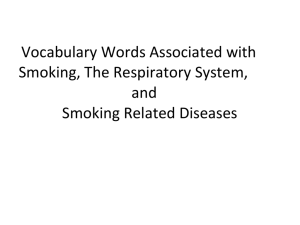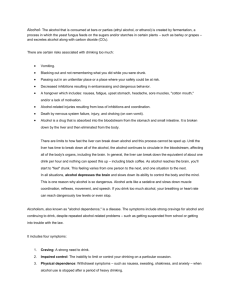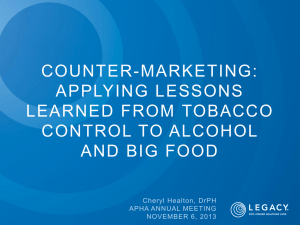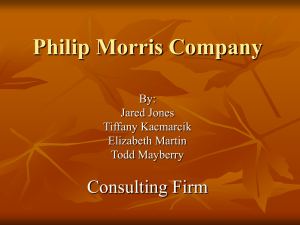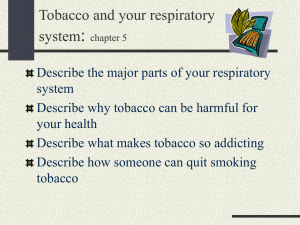Industry Part 2 – 1965 – 1999
advertisement
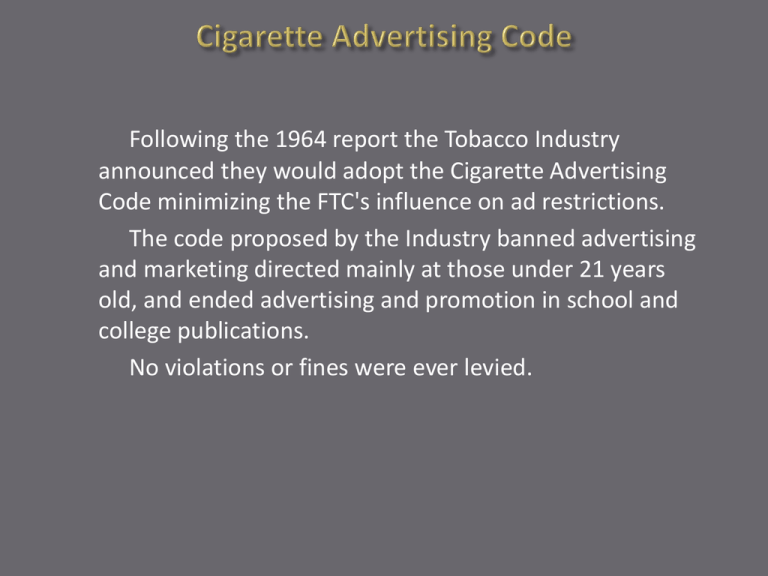
Following the 1964 report the Tobacco Industry announced they would adopt the Cigarette Advertising Code minimizing the FTC's influence on ad restrictions. The code proposed by the Industry banned advertising and marketing directed mainly at those under 21 years old, and ended advertising and promotion in school and college publications. No violations or fines were ever levied. The Tobacco Industry refused to publicly admit the link between cigarettes and health. The tobacco companies were tracking the scientific research concerning smoking and health as early as the 1940’s. By the 1960’s companies were secretly carrying out animal research. “Joseph Bumgarner RJ Reynolds scientist. “they started out with the best of intentions…and then something scared them.” Project 6900 Philip Morris In 1966 Philip Morris investigates the carcinogenicity of tobacco smoke, often using animal experiments. A semi-annual report on the project reports that, ""gross lung pathology can be induced by smoking cigarettes.“ Creating Doubt The Tiderock Marketing Company Reported to the Tobacco Institute on November 20, 1967 to re-established the “cigarette controversy” Tobacco Institute’s White Paper was released in 1968 With the ban on Advertising, Tobacco Companies sponsored cultural events Virginia Slims Tennis begins, with Billie Jean King a prime promoter. Philip Morris' Women's Tennis Assn. tour continued until 1994 The Tobacco Institute created the White Paper to covey the message of Project truth, a pamphlet portraying the few Drs. that believed smoking was not link to lung cancer and other diseases. http://www.archive.org/details/tobacco_gow27a00 Ex. 64 & 218 We do not believe cigarette are hazardous…they have not been proved to be unsafe… When as and if any ingredient in cigarette smoke is identified as being injurious to human health we are confident that we can elimate that ingredient RJR research scientist Claude Teague writes in a memo, "the tobacco industry may be thought of as being a specialized, highly ritualized and stylized segment of the pharmaceutical industry." “Tobacco products, uniquely, contain and deliver nicotine, a potent drug with a variety of physiological effects. “.. . Happily for the tobacco industry, nicotine is both habituating and unique in its variety of physiological actions, hence no other active material or combination of materials provides equivalent 'satisfaction..'" PM scientist Al Udow writes memo …Kool had the highest nicotine "delivery" of any king-size on the market…Kool's high nicotine is a reason for its success, …we should pursue this thought in developing a menthol entry. . .menthol smokers say they are not looking for high tobacco taste anyway. . . Although more people talk about 'taste,' it is likely that greater numbers smoke for the narcotic value that comes from the nicotine." “ The cigarette should be conceived not as a product but as a package. The product is nicotine. The cigarette is but one of many package layers. There's the carton, which contains the pack, which contains the cigarette, which contains the smoke. The smoke is the final package. The smoker must strip off all these package layers to get to that which he seeks." Marlboro becomes the best-selling cigarette in the world Marlboro Lights introduced, promising lower tar and nicotine. James Bowling, VP Philip Morris TI Executive Committee Wall Street Journal, January 24, 1972 Death in the West was filmed in 1976 by director Martin Smith, reporter Peter Taylor and a crew from This Week, a weekly show on Britain's independent Thames Television network. The show is roughly the British equivalent of 60 Minutes. “if the company believed as a hole that cigarette were harmful we would not be in the business” “The flat assertion that smoking causes lung cancer and heart disease and that the cases proved is not supported by many of the world’s leading scientists.” p9 Ex. 8000.752 “Scientists have not proven that cigarette smoke or any of the thousands of its constituents as found in cigarette smoke cause human disease.” p2 Victor DeNoble a Philip Morris scientists is hired to find a substitute for nicotine. He succeeded- but in the process, he proved something that the industry had been denying for years: that cigarettes were addictive. January 10, 1979 Bill Dwyer, Tobacco Institute Philip Morris pays movie companies to feature Marlboro trucks in there movies and changes Lois Lane’s character to be portrayed as a smoker. Ed Horrigan, RJR, CEO 1982, Congressional Hearing DOUBTS SMOKING CAUSES DISEASE Exhibit 8000.770.4 Ex. 1280 Ex. 1280 Ex. 1280 Ex. 1280 US Tobacco introduces Skoal Bandits -- a starter product, with the tobacco contained in a pouch like a tea bag. RJ Reynolds as the public in January 1984 http://www.archive.org/details/tobacco_cyy27 a00 Hired by Brown and Williamson, to create a safe cigarette Surgeon General Julius Richmond, “The industry would not quite yield to the data the existed. But they were still successful with the public with creating this notion. “ Alan Blum “The Tobacco Institute existed to create doubt and debate. They had a team of people led by Walker Merryman” “it may or may not be harmful” “it may or may not be harmful” “it may or may not be harmful” Kool featured a cartoon smoking penguin wearing shades, a buzzcut and Day-Glo sneakers. Marlboro Medium is introduced International ETS Management Committee (IEMC) is established in an effort to undertake better planning to deal with ETS related public policy. Consumers' Research Magazine publishes "Passive Smoking: How Great a Hazard?" "ETS is so highly diluted that it is not even appropriate to call it smoke." Marlboro Adventure Team contest is introduced. Philip Morris has called the MAT one of the most successful advertising campaigns in history Ex #617 Ceo who appeared before Henry Waxman committee William Campbell, CEO, Philip Morris James Johnston, CEO, RJR Tobacco Co Joseph Taddeo, President, U.S. Tobacco Co Andrew Tisch, CEO, Lorillard Tobacc Thomas Sandefur, CEO, Brown & Williamson Tobacco Co Ed Horrigan, CEO, Liggett Group Donald Johnston, CEO, American Tobacco Co. April 15, 1994 RJR reprints Sullum's WSJ article in a full-page ad, with the caption, "IF WE SAID IT, YOU MIGHT NOT BELIEVE IT." Reynolds' EPA assault includes as well a major multi-city tour of RJR representatives and scientists who meet with editors, writers and talk show hosts. The ad emphasizes that Mr. Sullum "is not associated with the tobacco industry.“ 7 Philip Morris reprints Sullum's March, 1994 Forbes MediaCritic article (a longer version of his WSJ item), "Passive Reporting on Passive Smoke," in full, in a series of 6 full-page ads in newspapers throughout the country, including the New York Times, Washington Post, Los Angeles Times, Chicago Tribune, Miami Herald, Boston Globe, and Baltimore Sun, under the heading, "SECONDHAND SMOKE FACTS FINALLY EMERGE / How Science Lost Out To Politics On Seconhand Smoke" Philip Morris paid Sullum $5,000 for the right to reprin In 1994 124 members of the House sent a sharply worded letter to the FDA, claiming the agency's tobacco proposal would put 10,000 jobs at risk and "trample First Amendment rights to advertise legal products to adults." Two weeks later, 32 senators signed a virtually identical letter. (According to Common Cause, those senators who signed the letter had received an average of $31,368 from tobacco, compared to $11,819 for those senators who did not sign. Similarly, the House signatories received an average of $19,446, in contrast to $6,728 for other Congress members.)--Mother Jones, 4/96 Geoffrey Bible, CEO of Philip Morris Cos. Inc., chairs a dinner underwritten by Philip Morris for the Republican Governors Association, and speaks to the governors about tobacco's benefits to the economy. The gala dinner pulls in an unprecedented $2.6 million The Tobacco Master Settlement Agreement (MSA) a court case between the four largest US tobacco Companies and the attorney general of 46 states. The states settled their Medicaid lawsuits against the tobacco industry; the companies agreed to curtail certain tobacco marketing practices. as well as to pay, in perpetuity, various annual payments of a minimum of $206 billion over the first twenty-five years of the agreement. "We at Liggett know and acknowledge that, as the Surgeon General and respected medical researchers have found, cigarette smoking causes health problems, including lung cancer, heart and vascular disease and emphysema. Liggett acknowledges that the tobacco industry markets to 'youth,' which means those under 18 years of age, and not just those 18-24 years of age.” Philip Morris launches website; for first time, acknowledges scientific consensus on smoking. "There is an overwhelming medical and scientific consensus that cigarette smoking causes lung cancer, heart disease, emphysema and other serious diseases in smokers,'' RJ Reynolds announces that it will sell its international tobacco unit to Japan Tobacco for $8 billion. RUPERT MURDOCH's Fox Network runs "Independence Day," the world's most expensive cigar commercial--and popular kid favorite--in prime time. Fox also produced the film (cigar product placement by Feature This). PHILIP MORRIS board member Rupert Murdoch's Fox Entertainment Group announces that it will launch a new Web-cable property called The Health Network. 2006 Snus Even in 2011 Reynolds American and Altria fund extravagant parties and sit on the boards of ALEC committees.
